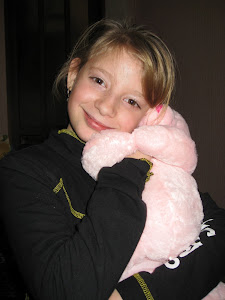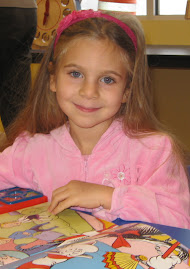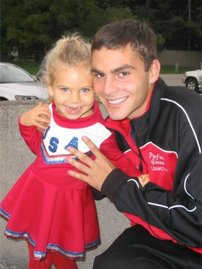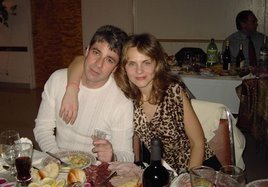We’ve been home for 2 months now, and it already feels like Rachel’s been in our family forever. She’s such a sweet little girl, very well behaved, trying to please us, always doing what she’s asked to do, etc. She and Victoria are a very good friends even though there is a healthy sibling rivalry between them :) Lately they started bickering a little bit more than before, but I think this is very normal after their “honeymoon period” has ended. There is still some jealousy between the girls in regards to the attention they are getting from Oleg and I (especially from Rachel, which is expected). We are trying very hard to spend an equal amount of time with both girls, and I think we are doing very good.
Rachel started gymnastics a couple weeks ago, and she loves it! She also started ballroom dancing lessons! Our local “Fred Astaire Ballroom Dance Studio” has a spring session for 4th-graders at our elementary school, and Rachel is a natural! Ballroom Dance is my weakness – I used to dance back in Ukraine, and Alex took several years of Ballroom Dancing as well, so my goal now is to find partners for both girls and start the formal lessons ASAP :)
Now that Rachel is getting more comfortable with her new life in America, I’d love her to find friends her age, but it’s not an easy task because her English is almost non-existent. One would argue that it’s because of the fact that we speak Russian at home, and I agree. According to Dr. Gindis, the leading expert in international adoption, a second language is usually acquired based on two models: "additive" and "subtractive". Internationally adopted children replace their first language by a new language, it’s a subtractive model, and the immigrants learn a new language in addition to their native language, which is an additive model. Since Rachel is speaking Russian at home, she acquires English by an “additive” model, and her language acquisition is supposed to be slower. But we’ve been through this before! Oleg, Alex and I started learning English virtually from scratch. All our friends came to the country not speaking any English and were able to learn it and go on to receive BS and even MS degrees. The process to learn English in immigrant families is usually the following: start with learning some basic vocabulary, then able to translate simple written English sentences into Russian, then being able to build simple English sentences, then start understanding native English speakers, and then finally start speaking. After this stage many kids (depending on age) usually stop speaking Russian, but still understand it, so when their parents ask them something in Russian, they reply in English.
After 2 months we see some progress with English, but it is VERY tiny. Oleg and I even decided to speak to her in English, but it doesn’t work! She starts crying when she doesn’t understand us! So what’s more important for us – her language development or her happiness? Of course her happiness! Yes, she’s very behind, yes, it takes her more time to memorize things, but hey – she has all time in the world to catch up. We are working very hard tutoring her, and I’m sure she’ll get there, even it will be later then we we’d want her to.
She still loves school :) Her teachers are AWESOME! I had a parent-teacher conference last week, and even though her academic progress is not as fast, her social progress is much better! She’s trying to communicate with other kids at school, which is a huge plus with her lack of language, and she seems much more comfortable in the classroom. She’ll probably repeat 4th grade with the same teacher, and hopefully by the end of next school year we’ll see more results.
Though I’m a little bit disappointed with her slow progress, it’s something that was expected. The post-institutionalized children are usually developmentally behind because they didn’t have a chance to be nurtured and educated by their parents. Of course a child whose parents started reading to him from birth, and a child who never had an individual attention, will have different results. I firmly believe that parents play a huge role in their child’s academic progress. It’s a parents’ job to prepare the children for school, to tutor them as needed, etc. Though all children have different abilities, I can say from my teaching experience that the kids whose parents work with them at home usually are better students.
Speaking of students, I recently connected with my former students in Ukraine! There is a new social-networking website http://www.odnoklassniki.ru/, where I found my old friends, classmates, neighbors, and even students! I used to teach Math for 6th – 9th graders, and imagine my surprise when I received a message from one of my former students! Then another, and another, and now I’m in contact with many of them! I only taught them for 3 years, but they still remember me! It was so nice to hear that I was their favorite teacher :) These “kids” are now almost 30 years old, married with their own kids, and it’s so strange when they address me formally with my patronymic name: “Nataliya Vitalievna”!
Anyway, back to my thoughts about parents working with their kids. I taught Alex to read by 4 years old, and I felt guilty that Victoria still didn’t read at 5. She recognized alphabet since 23 months old, she was doing “Color by number” and “Connect the dots” activities by 3 years old, etc., but I didn’t know how to teach her to read in English. Well, I’m happy to report that she’s reading now! These tutoring sessions with both Rachel and Victoria were good enough to get her started! Yesterday she even took one of the books to preschool and read a story to her class. The kids were very impressed :)
My other “baby” Alex doesn’t need my tutoring anymore, and even if he needed it, I wouldn’t be able to help him. Last semester he took a “Differential Equations” class, and even though I wrote my Master’s thesis in Differential Equations many years ago, I don’t remember ANYTHING :) His program requires several co-op blocks as a part of curriculum, and he’s looking for a job now. So if any of you are hiring a computer engineering/computer science/information technology intern, please let me know! Yesterday he attended a huge student job fair, and it was so neat to see him in suit and tie – he looked like a real professional!
We still didn’t have a chance to take a new family portrait, but I’m working on the plan to get everyone together for a photo session :)
Thursday, March 27, 2008
Tuesday, March 18, 2008
First Road Trip
This past weekend we drove 6 hours to New Jersey to visit our dear friends Anya and Dima. We’ve known each other forever – Anya, Oleg and met in 1st grade and were classmates all the way to the High School graduation. Then Anya, Dima and I were classmates at Odessa State University studying Math and Computer Science. So every time we get to see them it’s a treat.
It was a first road trip for Rachel. She loved it! Both girls had fun in the car watching cartoons as well as educational phonics DVDs :) We had to drive through downtown Philadelphia, and Rachel finally experienced bumper-to-bumper traffic in America! The traffic in Odessa is very bad, so she was very surprised not see it in our every day life in Rochester (there is no traffic on her school bus route :)
The weather was gorgeous – 60s and sunny – a welcome change after snow and 30s! All 5 kids (they have 3 kids ages 9, 12 and 14) had a blast riding the bikes, fishing and even riding the boats! So overall we had a great weekend, and the girls can’t wait to see their friends again.
In another news I’m happy to report that our post-adoption paperwork is done! Here is what we’ve accomplished:
- Social Security Number: applied in 2 days after arrival, received 10 days later;
- US Passport: applied 2 weeks after arrival (could’ve done earlier, we didn't need SSN to apply), received 3 weeks later;
- Certificate of Citizenship: received by mail 37 days after arrival;
- Ukrainian Consulate registration: sent last week!
Some people do these steps in a different order, but I wanted to get Rachel’s US passport before sending her Ukrainian passport to Ukrainian Consulate for registration. They take a loooong time returning Ukrainian passports (like several months!), that’s why I didn’t feel comfortable sending the only document verifying Rachel’s immigration status. But now she has her US passport, so I don’t really care about her Ukrainian passport anymore. Knowing from other people’s blogs how the Ukrainian Consulate tends to lose important paperwork, I sent Rachel’s registration by certified mail with return receipt. This way they won’t be able to lie and say they didn’t receive it. I intend to do the same when sending annual post-adoption report to them next year.
For those of you waiting to go, I would really recommend getting “Adoption Certificate” in Ukraine. It’s not required for American families, but it’s very handy! This certificate is issued at the same place where you get a new Birth Certificate, and it looks very similar – one page with parents names, adopted child’s old and new names, the court date and court decree number. It’s much more convenient to show this one page document than a multi-page court decree written in legalese. I also ordered certified translation of both Birth and Adoption Certificates from Hudson Translations, and used them everywhere. They have a raised seal and look very authentic!
It was a first road trip for Rachel. She loved it! Both girls had fun in the car watching cartoons as well as educational phonics DVDs :) We had to drive through downtown Philadelphia, and Rachel finally experienced bumper-to-bumper traffic in America! The traffic in Odessa is very bad, so she was very surprised not see it in our every day life in Rochester (there is no traffic on her school bus route :)
The weather was gorgeous – 60s and sunny – a welcome change after snow and 30s! All 5 kids (they have 3 kids ages 9, 12 and 14) had a blast riding the bikes, fishing and even riding the boats! So overall we had a great weekend, and the girls can’t wait to see their friends again.
In another news I’m happy to report that our post-adoption paperwork is done! Here is what we’ve accomplished:
- Social Security Number: applied in 2 days after arrival, received 10 days later;
- US Passport: applied 2 weeks after arrival (could’ve done earlier, we didn't need SSN to apply), received 3 weeks later;
- Certificate of Citizenship: received by mail 37 days after arrival;
- Ukrainian Consulate registration: sent last week!
Some people do these steps in a different order, but I wanted to get Rachel’s US passport before sending her Ukrainian passport to Ukrainian Consulate for registration. They take a loooong time returning Ukrainian passports (like several months!), that’s why I didn’t feel comfortable sending the only document verifying Rachel’s immigration status. But now she has her US passport, so I don’t really care about her Ukrainian passport anymore. Knowing from other people’s blogs how the Ukrainian Consulate tends to lose important paperwork, I sent Rachel’s registration by certified mail with return receipt. This way they won’t be able to lie and say they didn’t receive it. I intend to do the same when sending annual post-adoption report to them next year.
For those of you waiting to go, I would really recommend getting “Adoption Certificate” in Ukraine. It’s not required for American families, but it’s very handy! This certificate is issued at the same place where you get a new Birth Certificate, and it looks very similar – one page with parents names, adopted child’s old and new names, the court date and court decree number. It’s much more convenient to show this one page document than a multi-page court decree written in legalese. I also ordered certified translation of both Birth and Adoption Certificates from Hudson Translations, and used them everywhere. They have a raised seal and look very authentic!
Friday, March 7, 2008
International Women's Day
Tomorrow marks 6 weeks since Rachel came home. It’s also a second biggest holiday in Ukraine (after New Year’s) – International Women’s Day! Women of all ages receive gifts – daughters from mothers, teachers from students, aunts from nephews, etc. And since it’s a national holiday, everyone gets a day off! We don’t celebrate it with the gifts in our household anymore - Valentine’s Day and Mother’s Day are enough – but it still feels like a holiday to us!
We’ve come a long way during these 6 weeks at home. I’ve become a strict disciplinarian, which is a totally new role for me :) We have a routine for everything: playtime, study time, TV, bedtime, etc. Of course, Victoria had a routine before, but now I really enforce it, and I think it’s the reason Rachel is doing so well. All children are different, and it wouldn’t even occur to me to send Alex to bed at 8:00 pm when he was 10 years old. But Alex was always very mature, so this approach wouldn’t work for him. As most post-institutionalized kids, Rachel is emotionally much younger than her biological age. She’s more like 7- or 8-year old, and she needs a totally different approach than home-grown 10-year olds. I’m tutoring her every day in Math and English, and she’s really making progress! We started from scratch with the kindergarten and first-grade level work, and both Victoria and Rachel are doing amazingly well. I’m sure Rachel will be able to catch up very soon on her age-appropriate level when she learns the basics. Victoria really benefits from these sessions, and I’m afraid she’ll be bored in kindergarten next year :)
What else is new? Rachel experienced a lot of “firsts” during these 6 weeks.
First visit to the Strong Museum, which is one of the best children’s museums in the nation. The girls had a blast “working” as cashiers at the children’s Wegmans:

doing the weather forecast on TV:

and riding the carousel:

First visit to the mall, with an ice cream at Maggie-Moos:

First visit to the zoo:

First haircut! The hairdresser just trimmed the ends, but the result was awesome:



First gymnastics lesson! Rachel is very good in gymnastics, she should definitely try out for varsity team in high school :)
I started thinking about summer and already signed Rachel up for soccer and swimming. Both girls will go to day camps, it should keep them busy :)
Overall I’m very pleased with our transition so far. Rachel’s attaching very well, the girls are the best of friends, and our life is slowly getting back to our “new” normal.
We’ve come a long way during these 6 weeks at home. I’ve become a strict disciplinarian, which is a totally new role for me :) We have a routine for everything: playtime, study time, TV, bedtime, etc. Of course, Victoria had a routine before, but now I really enforce it, and I think it’s the reason Rachel is doing so well. All children are different, and it wouldn’t even occur to me to send Alex to bed at 8:00 pm when he was 10 years old. But Alex was always very mature, so this approach wouldn’t work for him. As most post-institutionalized kids, Rachel is emotionally much younger than her biological age. She’s more like 7- or 8-year old, and she needs a totally different approach than home-grown 10-year olds. I’m tutoring her every day in Math and English, and she’s really making progress! We started from scratch with the kindergarten and first-grade level work, and both Victoria and Rachel are doing amazingly well. I’m sure Rachel will be able to catch up very soon on her age-appropriate level when she learns the basics. Victoria really benefits from these sessions, and I’m afraid she’ll be bored in kindergarten next year :)
What else is new? Rachel experienced a lot of “firsts” during these 6 weeks.
First visit to the Strong Museum, which is one of the best children’s museums in the nation. The girls had a blast “working” as cashiers at the children’s Wegmans:

doing the weather forecast on TV:

and riding the carousel:

First visit to the mall, with an ice cream at Maggie-Moos:

First visit to the zoo:

First haircut! The hairdresser just trimmed the ends, but the result was awesome:



First gymnastics lesson! Rachel is very good in gymnastics, she should definitely try out for varsity team in high school :)
I started thinking about summer and already signed Rachel up for soccer and swimming. Both girls will go to day camps, it should keep them busy :)
Overall I’m very pleased with our transition so far. Rachel’s attaching very well, the girls are the best of friends, and our life is slowly getting back to our “new” normal.
Subscribe to:
Posts (Atom)




